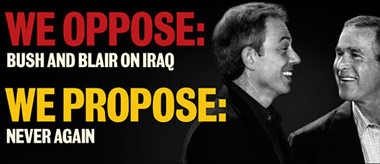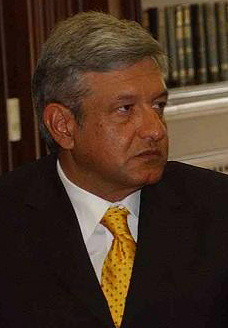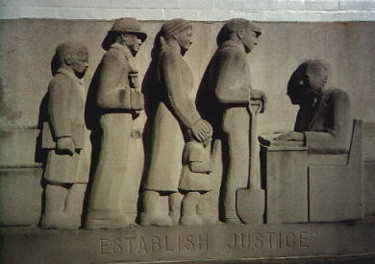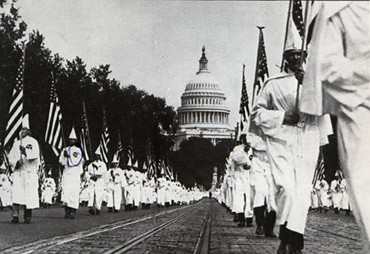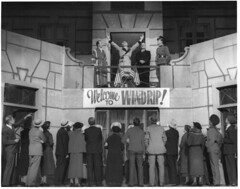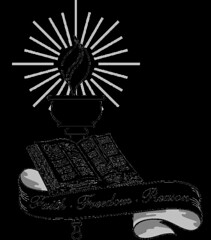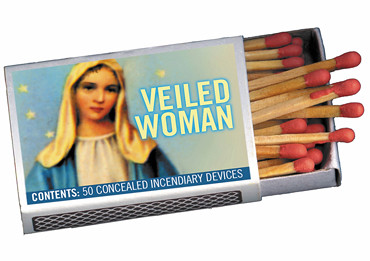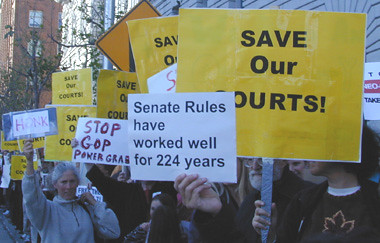
From the San Francisco "Judicial Justice" event, April 27, 2005
On April 22, there was yet another MoveOn email in my inbox. MoveOn PAC wrote: "Radical Republicans are hoping to seize absolute power to appoint Supreme Court justices who favor right-wing, corporate-biased interests over the rest of us. …We only have a few days to stop the Republican leadership from making changes that would turn back the clock on generations of progress!" They asked readers to act, so I signed up to participate in a local rally. I care about stopping Republican undermining of the rule of law -- and I am a student of political organizing. Here was a chance to see what email organizing, one flavor of what is sometimes called the "netroots movement," could really do.
Overall, I would say the rally was a success. Though what follows includes a lot of suggestions for doing something like this better, in five days, mostly by email, a group of people new to one another, without much meaningful institutional backing, managed to put on an event which left at least this participant exhilarated rather than just tired! That's not bad.
One holds one of these things for a variety of reasons. Let's look at some:
1) We aim to effect policy, legislation, something being done by politicians somewhere. Because MoveOn PAC was making a nationwide call, they had to be somewhat vague about purpose (see quotation above.) Some people in some locations are represented by Senators whose position on the radical Republican plan to end the filibuster and pack the courts is not set in stone; the purpose of rallies in those states is totally clear: swing those votes! Most people know how their Senators would vote on the nuclear option. So what are the rest of us doing?
2) When lots of people are willing to act for a principle, their action shows some force. That's why these things are called "demonstrations." Politicians are put on notice that something is stirring; participants get to feel their power together. At the rally, more than one participant remarked on how good it felt to "do something." Now thinking literally, it is hard to think of standing around with signs on a street corner as "doing something" but we need that feeling and by calling these events, MoveOn gave it to us.
3) Participation in an event increases "buy-in," identification with the sponsoring organization. Maybe, but I am not so sure this happened in this case. We hear from MoveOn all the time. We're glad it is there, chipping away in the political wasteland. But though MoveOn brought us to the event, I don't know if it got the credit, emotionally. I suspect that went to the "host" who emailed us or to ourselves for "doing something." I could be wrong on this; obviously this is just a guess.
The call was for a "host" (interesting title, more reminiscent of a house party than a rally) to select a location in front of a courthouse or Federal building and "invite" participants. And for this one, Liz DeLong bravely did! The MoveOn plan promised to funnel volunteers to her, to provide themes, and to count on the creativity and capacity of attendees for the rest.
In our case, following MoveOn's advice, Liz picked the front of the Federal Court Building at Seventh Street and Mission. It was not an easy rally site. Though the sidewalks are 20 feet wide, we were all going to have to stretch out for some hundreds of feet on two very busy streets at rush hour. The plan for the rally called for no amplified sound, so no permit. Great idea, but this is San Francisco -- within a couple of days Liz had 900 people signed up to come and a couple of bullhorns. Not an organizer's dream exactly. In the event we had 400-500 attendees, very loud conditions because of being stretched out and drowned out by traffic, and no speeches that could be heard. I am not sure this mattered much to people; MoveOn's complicated plan for selecting participant speakers was just impossible, so a few people just talked to a few attendees with the bullhorn. Perhaps, if MoveOn PAC suggests again that people hold rallies without sound, they should also suggest that numbers be limited to 250 sign-ups (figuring a 50 percent "flake factor," that gives 125, about the maximum who can really hear a bullhorn.)
To anyone who has ever planned a rally, what was notably lacking in this was a sponsoring organization. Yes, MoveOn provided a FAQ. But usually for a rally to happen, some set of people with some experience of each other and some accountability to each other have to plan together. This had NO institutional backers. Fortunately, Alec from Democracy Action, took charge of finding monitors and provided a lot of signs. The Alliance for Justice brought their Save Phil the Filibuster campaign. Some heavy weights of the Democratic Party activist scene, including Howard Wallace and Jane Morrison, came as individuals. But mostly this worked because the people who came (median age probably 55 and many older; nearly all white; voters all) knew the ropes.
Here's where I really would fault MoveOn. A clear, widely disseminated message makes a rally more than just a pleasant couple of hours for a few people who attend. Frankly, the MoveOn plan didn't help with this at all. Their message was diffuse. Especially when an issue is convoluted, as preserving the filibuster to prevent rightwing judicial appointments necessarily is, your message has to cut through the complications, even if it oversimplifies and therefore feels unsatisfactory. For this purpose, probably the best thing MoveOn provided were a couple of simple chants such as "Save our courts!" and "Our Rights! Our Courts!" We used them and nonetheless tourists came across the street to ask the very safe appearing middle class crowd, "what is this all about?" You have to treat the media as if it were those tourists; reporters are hurried, ill-informed and a little lazy, just like most of us. Your message has to be so simple they can't miss it. And you need press packets and flyers to spoon feed your message to reporters; to my knowledge (could be wrong) MoveOn didn't provide these.
The least helpful of MoveOn's suggestions was for signs. They rightly understood that most people don't have a printer that will spit out something larger than letter size paper -- but there is no point in helping people to make letter size signs; no passerby can read them. And the signs should carry the rally message, not something cute. MoveOn had some notion we could pretend the Republicans were keeping us out of federal buildings by carrying "Keep Out" and "Right Wing Only" signs -- this is so convoluted I can't even explain it. See the picture below.
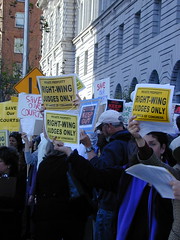
Fortunately, between Democracy Action and your blogger, we were able to make and borrow enough large, clear signs to somewhat unify the message.
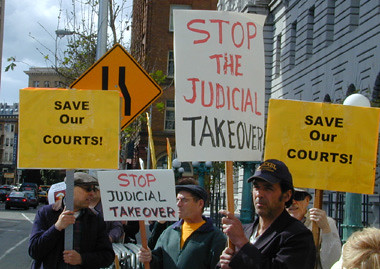
This was a little more what was needed. However, I do note that we had NO print media coverage locally that I have been able to Google -- we made it too hard for reporters to understand what we were about, I think.
Still, this was a solid, much needed contribution to the push back against one party rule in Washington. Thanks to MoveOn for calling it and to all the people who worked so quickly and responsibly to put it on!




